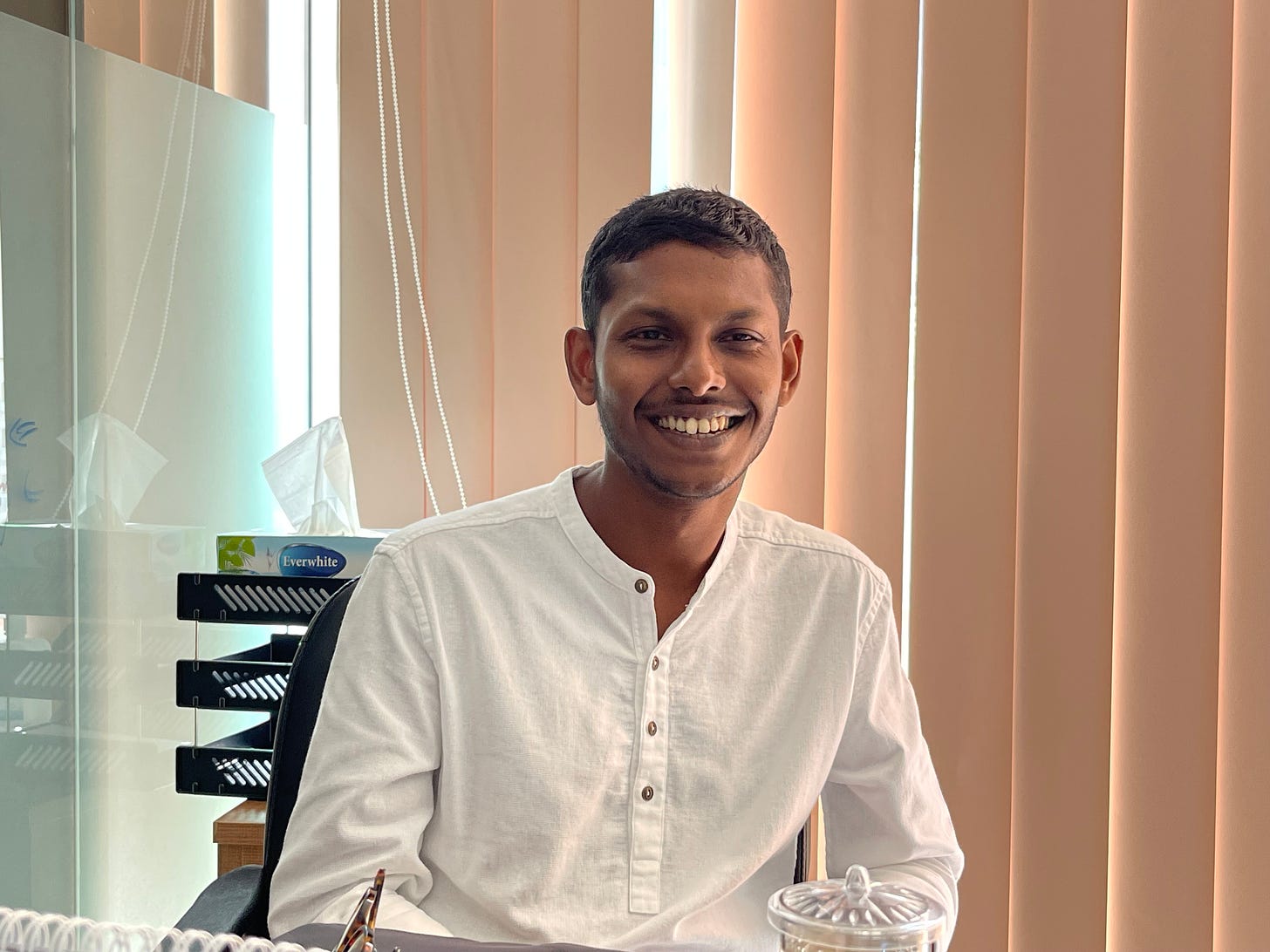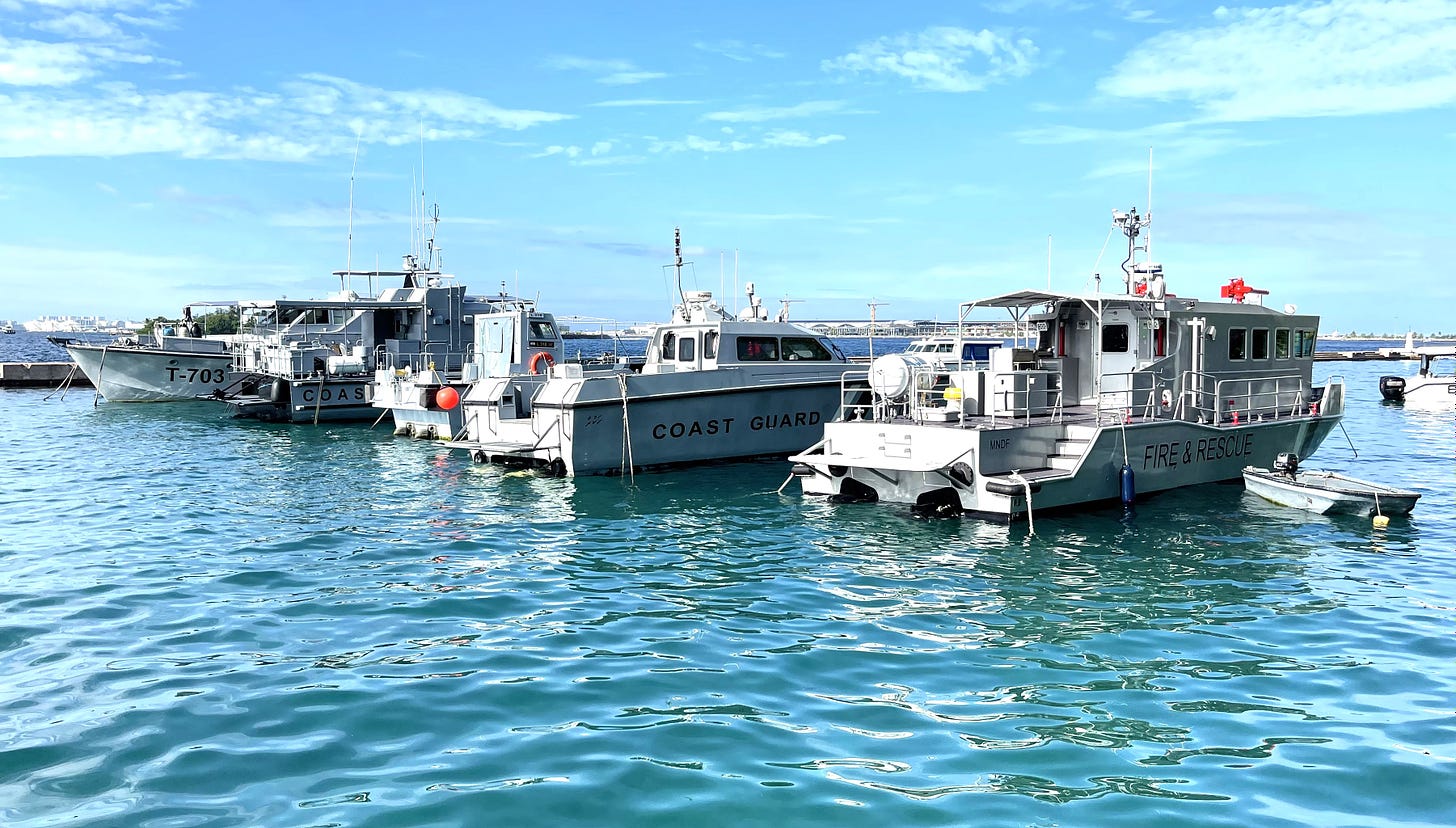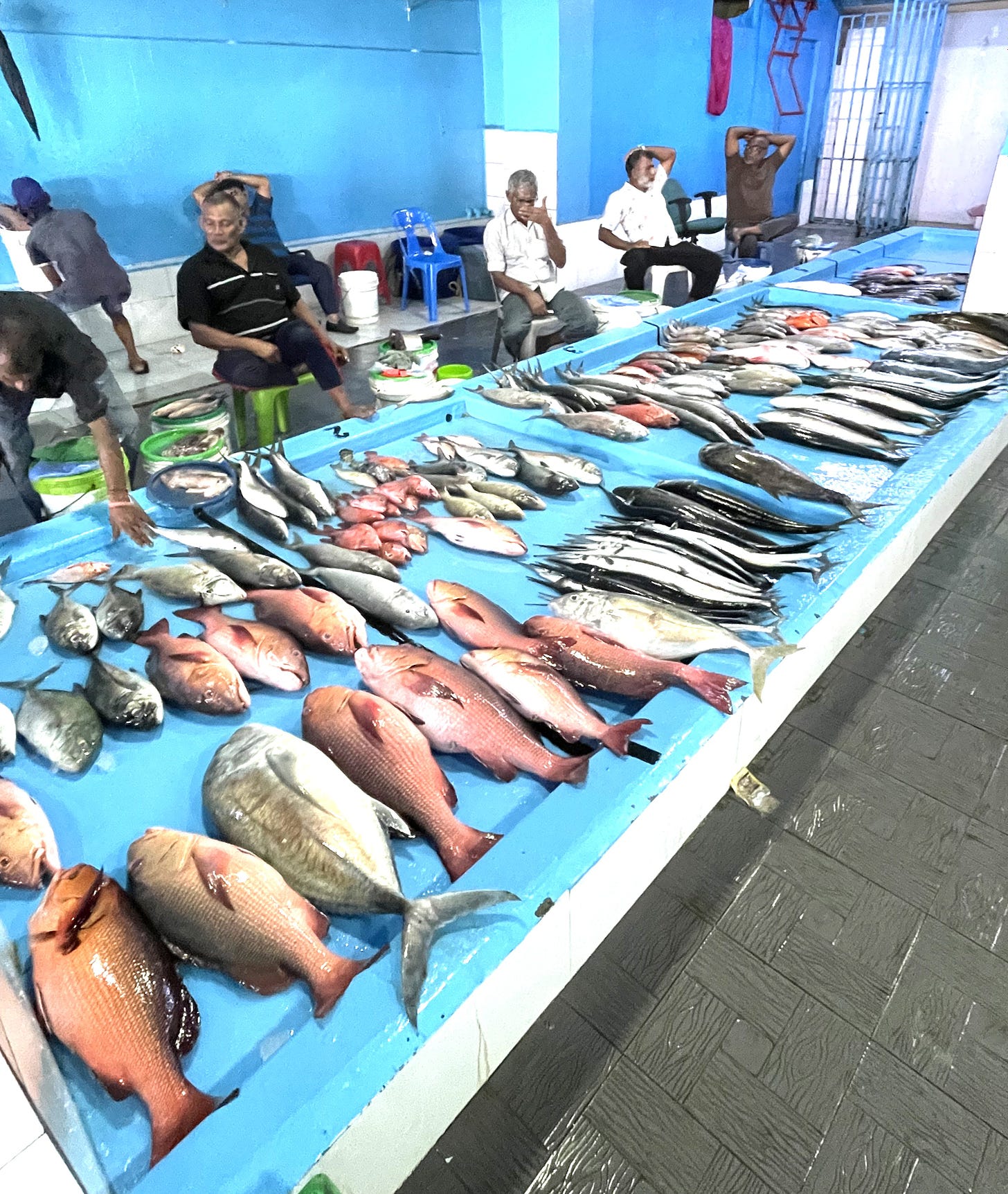An Island Paradise at a Critical Crossroads
How some of the world’s biggest challenges could shape upcoming elections in the Maldives
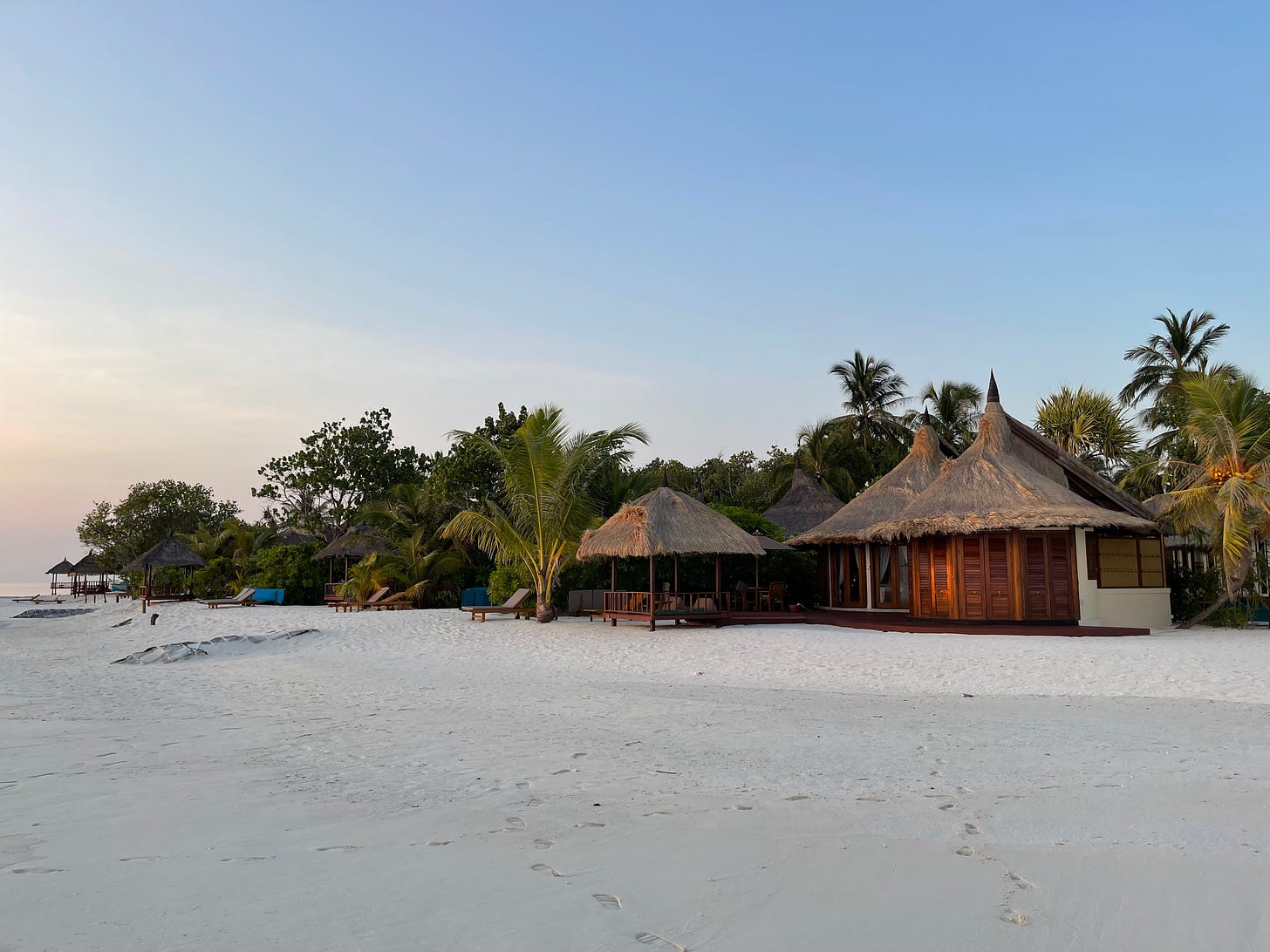
An island nation slightly north of the equator in the Indian Ocean, the Maldives makes its claim to fame as a high-end international tourist destination. A short flight from Sri Lanka and southern India, the country’s exclusive resorts have been made famous by travel magazines, romance movies, and travel shows.
The prevailing image of luxury resorts and the natural beauty of white sand beaches on crystal-clear blue ocean waters can make it easy to forget that the Maldives is an actual country with more than half a million people fighting, like many others around the world, to define their future through a better politics.
My visit to the Maldives this spring underscored how this small country is impacted by some of the biggest forces shaping the broader world today: the global struggle for freedom, a wider competition for influence between China and India, and threats from religious extremists and climate change.
The themes that The Liberal Patriot examines in America and other countries around the world are very much present in the Maldives, all of centered on one core challenge: how ordinary people can face down entrenched political and economic elites to make their lives better.
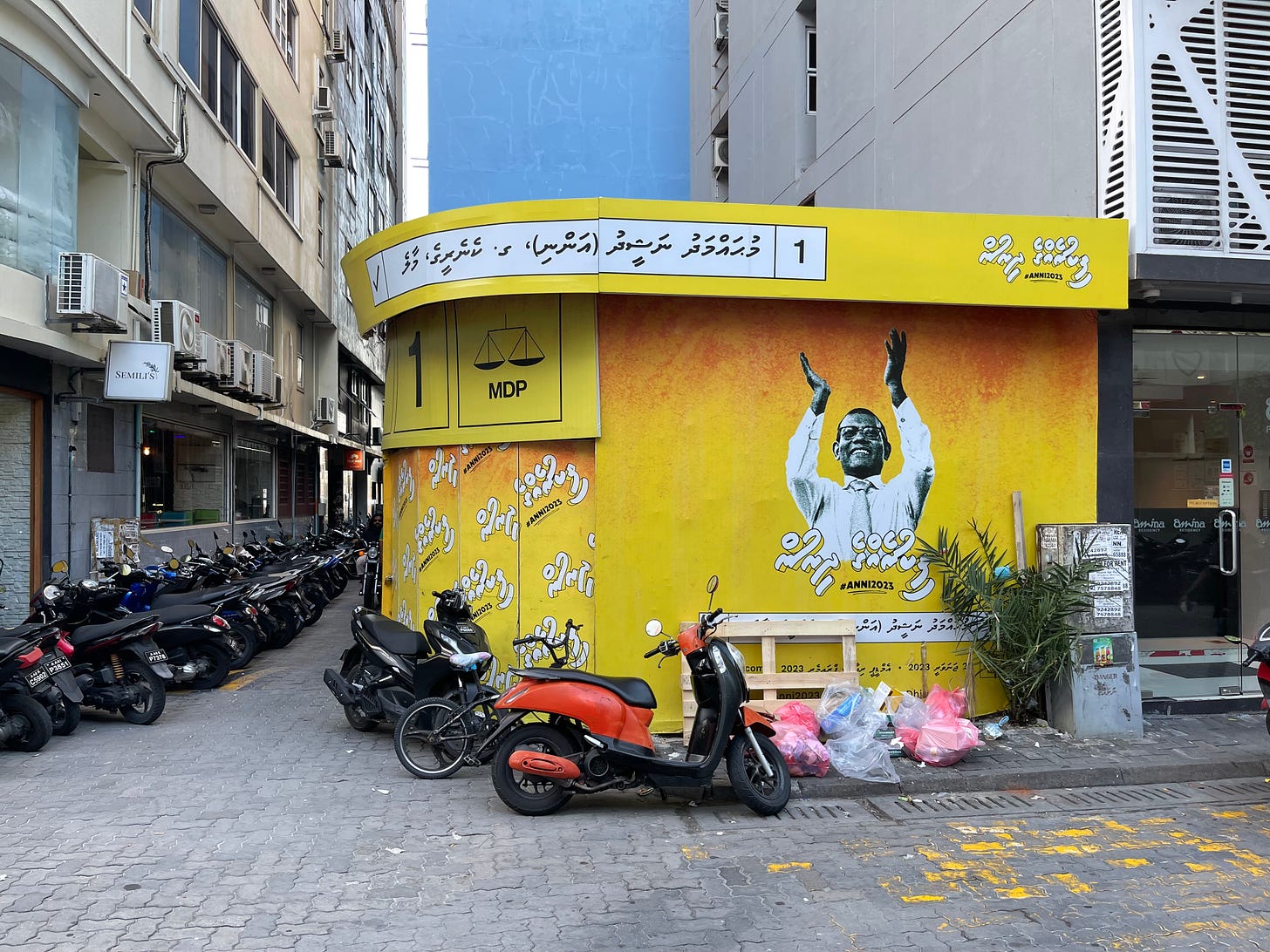
The struggle for freedom—and a better national politics
The Maldives will hold a presidential election this September, with more than 280,000 people eligible to vote according to the country’s Election Commission. On paper, at least, the country is a constitutional democracy and has held elections regularly over the last decade—but there remain some major constraints on basic political rights and civil liberties.
Freedom House, a U.S.-based research and advocacy organization focused on human rights, ranks the Maldives as “partly free” because of a poor record on issues like combatting corruption, protecting religious freedom, and ensuring gender equality, in addition to significant restrictions on press freedom and civil society. The most recent annual human rights report on the Maldives issued by the U.S. Department of State cites similar concerns.
Conversations with journalists, politicians, and human rights activists in Malé, the capital city, all identified a common problem: the disconnect between most of the people of the Maldives and their political elites. Some described it as “dynastic politics,” similar to what’s been seen in nearby countries like Pakistan and Bangladesh. Politics in the Maldives can sometimes look like a family fight, with debates taking place over Viber messaging groups, a service used to communicate and share news over mobile phones—especially since the pandemic.
Moreover, certain rulers and their families have maintained their grip on power despite the regular elections that followed the end of three decades of one-man rule by former President Maumoon Abdul Gayoom in 2008.
Speaking over afternoon tea on a sunny afternoon as we looked out over the capital city’s harbor, Humaida Abdul Ghafoor, an independent researcher and human rights, environmental, and climate change activist, described Maldivian politics to me this way:
We have very top down and hierarchical politics here. If you look at all the parties, they are very much male-dominated and hierarchical—even to the point if they talk about democracy they can’t practice it because they are not democrats by any stretch of the imagination, because if democracy means consultative politics, then they don’t believe that, because what they say is what they expect to happen.
Abdul Ghafoor described how this style of politics repels ordinary voters in the Maldives:
People have an aversion to politics because the politics have become so toxic and so unproductive and so personal—so people try to distance themselves from politics, because that’s really counterproductive, because you can’t improve your situation by doing that.
Disgust with political elites is a familiar theme in many electoral democracies, including today’s America, with ordinary voters facing special challenges in getting their voice heard at the national level. In the Maldives, endemic corruption at senior levels of government and politics remains one of the main hurdles citizens need to overcome.
The magnitude of the country’s corruption was exposed in a 2016 documentary by Al Jazeera’s Investigative Unit on a money laundering case involving the theft of government tourism revenue by former president Abdulla Yameen. The half-brother of former president Gayoom, Yameen was ultimately sentenced to 11 years in jail and fined $5 million for accepting bribes and money laundering. But his party remains divided over whether it should put him up as a candidate in this year’s elections due to questions about whether he could actually legally participate, an echo of the questions today’s Republican Party now confronts with former president Donald Trump.
Heavily dependent on international tourism and a government decision-making process strongly centralized in the capital city, the political economy of the Maldives provides little room for the voice of ordinary people. The country’s political and regulatory institutions offer little protection. A few interviewees said some companies use the prospect of jobs as leverage to try and attract votes at election time.
But a core problem is a democratic system without close ties to the people and their interests. As Sara Naseem, communications and advocacy manager for the anti-corruption group Transparency Maldives, told me:
Maldivian politics has turned into personality politics like a lot of places in the world, and a lot of parties don’t do the job of designing platforms by listening to the people. Similarly big development projects have been implemented without the involvement of the people, they are given a choice of either accepting this project or that the possibility that the central government would be upset if the people disapproved of the project.
This political culture encourages people to disengage from politics or only pay superficial attention to the issues, and Naseem argues that many in the next generation see little relevance for the political process. “I saw the downfall of a dictator [when former President Gayoom’s 30-year rule ended in 2008], but all that the young people today see are corrupt, self-interested figures competing for power,” she told me.
Not everyone shares this perspective about the younger generation’s lack of enthusiasm for politics. Mohamed Saif Fathih spoke with me in his office at the Malé City Council. At age 31, he’s the youngest member of the capital city’s council and sees hope in the fact that the Maldives has a younger population:
We have a youth bulge and the next generation’s spirit cannot be tamped down—we have a lot of young people who are committed to change in their lives and in pursuit of a better life. We outnumber the older generation. And we envision a different world, a freer world.
There are nevertheless signs of voter apathy and disinterest just a few months ahead of the country’s next elections. A recent poll by the Baani Centre for International Policy, a think tank based in the Maldives, found that a majority of voters were either undecided or not planning to vote in the September elections.
Foreign influence and the competition between China and India
A nation of about 1,200 islands with only a couple hundred of those inhabited, the Maldives has been a place where foreign visitors have often come and had an impact on local life. Ibn Battuta, the famous Muslim legal scholar and travel writer of the 14th Century, was convinced to stay a while longer by local authorities who had recently converted from Buddhism to Islam and who were looking for someone with a strong knowledge of Islam to serve as chief judge.
These days, China and India appear to be two outside forces playing an important role in the Maldives. The Maldives is a Muslim-majority country that continues to enjoy close ties with Arab Gulf states like Saudi Arabia and the United Arab Emirates. But it’s Beijing and New Delhi that seem to be vying for influence inside of the country today.
China has invested heavily in the Maldives via its ambitious global Belt and Road Initiative, the massive infrastructure program announced in 2013 that aims to create a network of ports, rail systems, highways, and border crossings to facilitate China’s economic rise and expand its global influence.
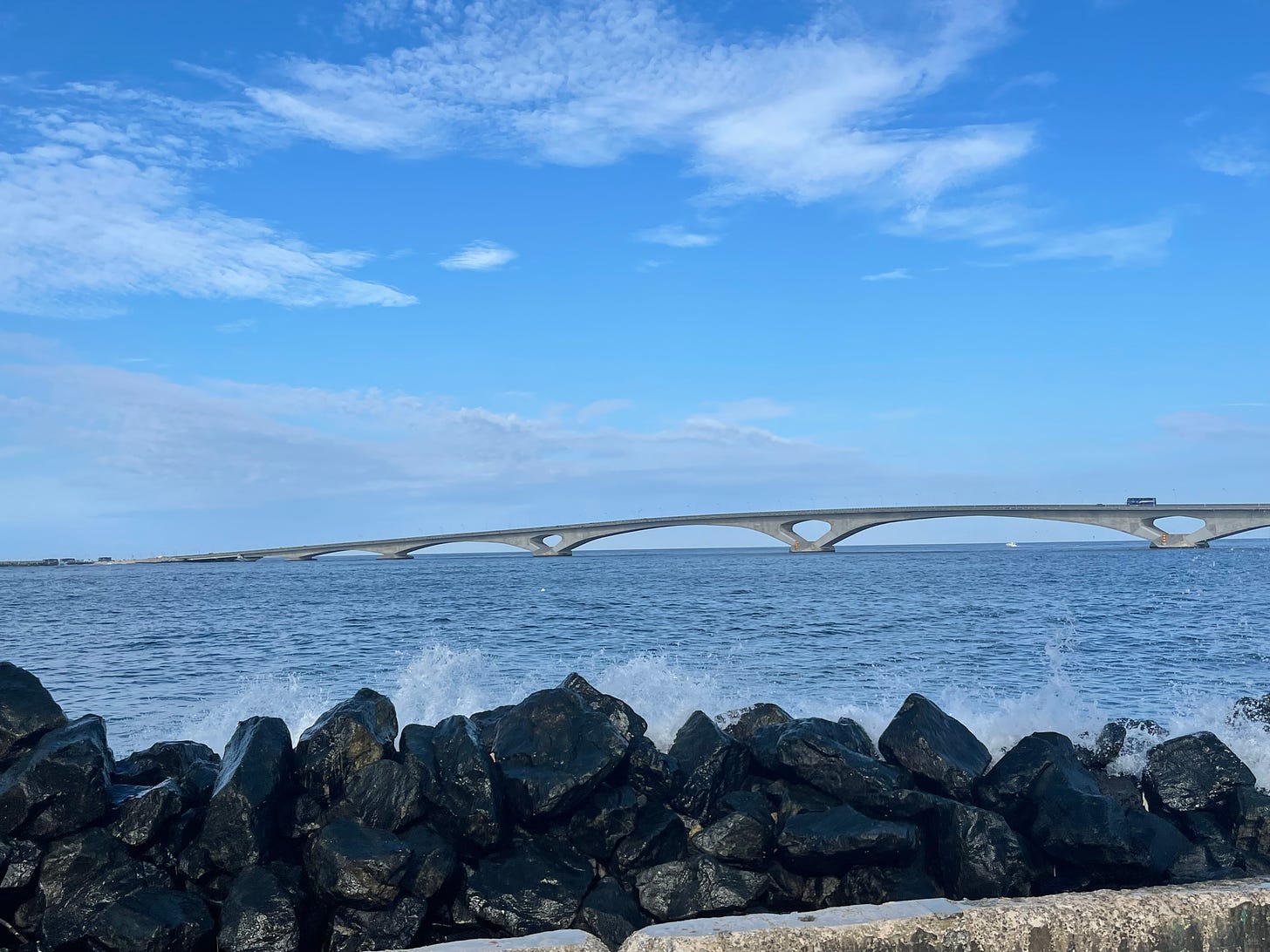
The most tangible outcome of this initiative in the Maldives is the China-Maldives Friendship Bridge, a cross-sea bridge connecting the country’s international airport to the capital city. China’s propaganda machine proudly touts this project, which took about three years to build and opened in 2018. In addition, China has underwritten the country’s national museum in the heart of Malé as well as numerous land reclamation and road projects.
Some voices are critical of this lean inside of the Maldives towards China—more so especially during the second half of the past decade—in part because the country accumulated significant debt as a result of some of these projects. “We owe so much money to Chinese banks,” Malé City Councilor Mohamed Saif Fathih told me, and that fact has caused others to look to India as an alternative.
India has gotten in on the action too, stepping up its security and economic engagement with current President Ibrahim Mohamed Solih’s administration. This move has prompted a reaction from the opposition, with former president Abdulla Yameen mounting an “India Out” campaign—but it’s uncertain how much these geopolitical machinations matter to ordinary Maldivians. As Sara Naseem of Transparency Maldives told me, “It’s not clear to your average person in the Maldives. [They] don’t understand what interests China or India might have here—a lot of the campaign sentiments is just really loud rhetoric.”
As someone who has worked for decades around the world and in the Middle East in particular, it was striking to me just how little America registers in the Maldives. Right now, there’s no U.S. embassy in the country, though that may change soon, and the U.S. Agency for International Development supports some development projects by working with partners in the country. In 2020, the Pentagon signed a framework defense and security agreement with the Maldives, and the U.S. military has conducted some training and support programs with the small military in the Maldives. With an increasing focus on competition with China and building partnerships with India, it’s easy to imagine that the United States might step up its own overall engagement.
Religious extremism challenges national identity
A third major issue that the Maldives has experienced in recent years that’s connected to wider global trends is religious extremism. According to some researchers and data, the Maldives was one of the largest per capita sources of foreign fighters for the Islamic State in Iraq and Syria from 2014 to 2018. The country still faces some threats from terrorist groups as well.
But the Maldives remains generally stable and peaceful—the security risks inside the country are nothing like what’s been seen in places like Iraq and Syria. There was an assassination attempt against parliament speaker Mohamed Nasheed in May 2021, but violence like this remains extremely rare.
Like in other countries, however, the seeds for religious extremism have been sown over time. They only seem to take root because of the shortcomings in the country’s politics and a lack of responsiveness to the basic needs of ordinary citizens by ruling elites. Mohamed Junayd Saleem, a prominent journalist, told me that the 2004 tsunami and its impact on the islands was a “very catalytic moment.” As the “worst disaster in living memory,” it opened the door to a reactionary interpretation of Islam that challenged the more moderate, liberal version of the religion that had defined the Maldives for decades.
Some lamented this recent trend towards religious conservatism in society and the politics of the Maldives today. They say that Islamists are educating people in mosques and running workshops, adopting a long-term, more subtle approach than seen in other countries. The young Malé city council member Mohamed Saif Fathih said that the most catastrophic scenario would be for “our society to capitulate and bow down to extremist ideas. It would destroy us. We would not be a people anymore.” While he remains optimistic about the country’s youth, he acknowledges that there’s a real risk of losing the unique Maldivian national identity:
We’ve been Muslims for 900 years and our grandparents did not wear the veil, and we were not Arabized—we were Maldivians first, and it’s sad that we are losing our identity, and our language as well, because everything is getting more “Arabized…” We are losing our identity actually.
The existential threat from climate change
Climate change looms large in this low-lying island country in the Indian Ocean. Like many other places around the world, stronger storms, beach erosion, coral bleaching, and depletion of fresh water sources are all an effect of climate change, one felt acutely in the Maldives.
What’s most interesting about the current climate change discussion in the Maldives is its pragmatic tone, and many people see the issue in terms of adaptation and resilience. Unlike other parts of the world where the climate debate is linked to cultural and identity politics, my sense from this trip was that the people of the Maldives were looking for tangible, practical steps to address the changes in their physical environment. For example, a few years ago, Japan helped build seawalls that protect the people of Malé, the most populated part of the country.
Despite some attention-seeking political stunts in the recent past, activists in the Maldives generally organize campaigns and protests about specific development projects that they see as doing more harm than good for particular communities. Political leaders talk about the big picture, too, citing the fact that the Maldives borrowed to undertake infrastructure projects to build hospitals, schools, roads, and harbors that have collapsed or are less secure because of climate change and its effects on the communities—and now the country will face additional costs for climate adaptation while still having to pay off the debts from past projects.
Climate change presents a very real and present threat to the Maldives, but the impression I got was that the country’s conversation focused on more practical measures that could directly impact the lives of its people. Institutions and processes, for instance, could be improved to take tangible steps like improving waste management or creating more inclusive politics that lifts up the voices people in communities around the country in order to better address the direct impact climate change is having on their lives.
As the Maldives heads to a presidential election this fall, its people are facing issues similar to those faced by many other people around the world, all of them linked to the common challenge of making the country’s politics yield better outcomes and improve citizens’ lives. In an era when President Biden calls the competition between democracy and authoritarianism the central fight of our times, the people of the small island nation of the Maldives see this struggle directly affect their lives—and the side most likely to win will be the one that produces the most and best results for ordinary people.





